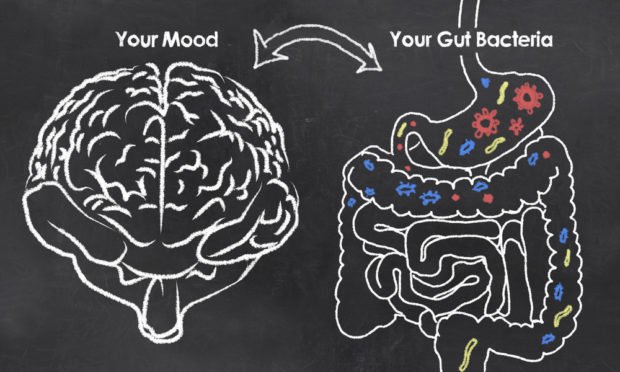In this Q&A gut health expert and nutritional therapist, Camilla Gray from Optibac Probiotics explains the effects that stress can have on your gut. She also explains how to ease any painful or embarrassing symptoms and what foods to eat – and avoid – during periods of increased anxiety and stress.
Q: What effect does uncertainty/worry have on the gut?
A: When we’re worried about something, it can have an effect on our entire physical body, but especially the gut. The gut and the brain are linked via a huge network of nerves. The biggest one being the vagus nerve, which serves as a two-way highway, passing information back and forth.
Brain gut health connection
Have you ever felt butterflies or a tight knot in your stomach after hearing some good or bad news? This is the gut/brain connection, with some scientists even referring to the gut as the ‘second brain’ due to the many neurons found in our intestines!
Q: Does the link between the gut and anxiety link in with evolution and ‘flight or fight’ reaction?
A: Worry and uncertainty are ultimately emotions that cause stress on the body. When we feel stressed, our body releases the chemicals adrenaline and cortisol, which makes our heart pump faster, our muscles contract and directs our blood to the brain and limbs.
 This is a survival mechanism as eons ago when our ancestors were faced with life-or-death situations like being chased by a large animal, it would’ve been vital to think and run quickly. This state is known as “fight-or-flight.” It is absolutely fine and needed in the short term (very useful if you are crossing the road and a car comes hurtling at you), but chronic stress over a prolonged period has been associated with serious health conditions and doesn’t do anything good for your gut health.
This is a survival mechanism as eons ago when our ancestors were faced with life-or-death situations like being chased by a large animal, it would’ve been vital to think and run quickly. This state is known as “fight-or-flight.” It is absolutely fine and needed in the short term (very useful if you are crossing the road and a car comes hurtling at you), but chronic stress over a prolonged period has been associated with serious health conditions and doesn’t do anything good for your gut health.
Q: What are the physical effects that stress can play on our gut health?
A: Some common physical effects we can see from increased or chronic stress include cramps, nausea, and diarrhea. When we’re in this “fight-or-flight” state, blood is being sent to the brain and limbs, where it is needed for our survival. This means that other body systems that are not needed during this state of hyper-arousal, such as the digestive and reproductive systems, are repressed.
Blood flow to the gut is affected. This means digestion cannot function properly, resulting in issues such as bloating, cramps, nausea, constipation, and diarrhea. Aside from these symptoms, stress can also lead to poor nutrient absorption – a breakdown in the intestinal wall’s barrier function – and can negatively change the number and composition of gut microbes and your gut health.
Q: Should probiotics be used to help those with diagnosed cases of health anxiety/stress/IBS and so forth?
A: If you are looking to support a specific health condition, it’s imperative to choose probiotic strains that have been researched to help.
Specific probiotic strains have been researched for their effects on stress, anxiety and low mood. A study published in the British Journal of Nutrition in 2011 tested two probiotic strains in combination: Lactobacillus acidophilus Rosell-52 and Bifidobacterium longum Rosell-175, and results from this trial suggest that this probiotic combination supports mental wellbeing.
If stress results in IBS type symptoms, it can be helpful to address these issues first. One strain that has been extensively studied for IBS symptoms, including pain, bloating, and diarrhea, is Lactobacillus acidophilus NCFM® which can be found in specifically formulated gut health products.
If constipation or diarrhea are predominant symptoms, it’s worth adding additional products that are specifically designed for either symptom on top.
Q: Are there foods to avoid when you are having gut issues linked to stress?
A: We shouldn’t underestimate just how much our diet can affect our stress levels and, in turn, our gut health.
![gut health vegan options [longevity live]](https://longevitylive.com/wp-content/uploads/2019/09/broccoli-delicious-diet-1580466-213x320.jpg)
Firstly, although not a food, caffeine should be avoided during times of increased stress. Caffeine adds to strain on the body and nervous system by triggering cortisol release, which can irritate the gut causing diarrhea, and preventing vitamin and mineral absorption. It’s wise to limit high sugar and processed foods that can be hard to digest and act as a food source for bad bacteria causing further digestive issues.
Eat well-balanced meals
During stress, it is helpful to eat 3 well-balanced meals per day, each containing some protein, good fats and fibre to stabilize blood sugar levels and regulate hormones. However, red meat is harder to break down, so it can be helpful to stick to a protein that is easier to digest like white meat/fish, eggs or tofu.
Other tips to help reduce stress and anxiety if you are experiencing gut health issues:
-
Try breathing techniques that can help you calm down at the moment. Deep breathing from your diaphragm is known to help your body relax and can help with calming down the symptoms of anxiety. The increase in oxygen to the brain will inform it you are okay. In turn, this may help to ease painful cramps caused by anxiety.
-
Switch off – TVs, radios, and mobile phones – when news is causing you additional anxiety. Of course, it’s important to stay connected with world events, but constantly checking the news for updates can cause alleviated levels of tension and unnecessary panic.
-
Know that there are people you can speak to – whether this is a trusted friend, colleague, family member or a professional – and you are certainly not alone.
About Camilla Gray DipCNM Nutritional Therapist
 Camilla Gray is a Nutritional Therapist who studied Naturopathic Nutrition at the College of Naturopathic Medicine (CNM), now specializing in IBS. She currently advises as a nutritional therapist for Optibac Probiotics UK.
Camilla Gray is a Nutritional Therapist who studied Naturopathic Nutrition at the College of Naturopathic Medicine (CNM), now specializing in IBS. She currently advises as a nutritional therapist for Optibac Probiotics UK.
Camilla has guested on several podcasts, including The Shredded Show hosted by Charlie Johnson and The Get In Shape Show with Emily De Luzy. She has also been featured in the Daily Mail, Netdoctor, and Woman’s Own Magazine.
References:
- PubMed: Assessment of psychotropic-like properties of a probiotic formulation (Lactobacillus helveticus R0052 and Bifidobacterium longum R0175) in rats and human subjects. https://pubmed.ncbi.nlm.nih.gov/20974015/
2. Optibac learning lab https://www.optibacprobiotics.



![women [longevity live]](https://longevitylive.com/wp-content/uploads/2020/01/photo-of-women-walking-down-the-street-1116984-100x100.jpg)










